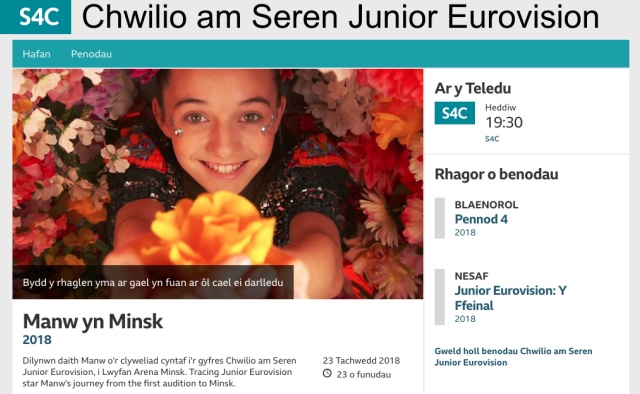After five decades of attempting to get a place on stage, the small principality of Wales will be making its Eurovision debut at the Junior Eurovision Song Contest 2018. For one of the four constituent parts of the United Kingdom – which competes in the senior Contest and had previously competed in Junior Eurovision between 2003 and 2005 – why is Wales’ debut seen as historic to critics and fans alike?
The Welsh History Of Eurovision
You’d have to go back to 1969, when BBC Cymru Wales made an aborted attempt to split the United Kingdom’s participation in an attempt to allow Wales to compete. Another attempt came in 1977 when a young Pete Waterman produced a single he had hoped would get attention to be the first Welsh Eurovision entry, again this venture never made it to the Song Contest that was held in Wembley that year.
The Welsh language broadcaster S4C had expressed interest in a Eurovision debut as early as 2008, however with the BBC keeping a firm grip on the senior Contest the only way the Principality would get a chance to sing in a ‘traditional’ Eurovision Contest would be on the Junior stage (as well as participating in Eurovision Choir of the Year 2017). The United Kingdom, via ITV, last participated in the Junior Eurovision in 2005, before withdrawing due to low viewing figures. In the senior Contest, no more than seven Welsh singers have represented the UK at the Contest, including a victory from Nicky Stevens as part of Brotherhood of Man in 1976.
Here Comes Junior Eurovision
So what makes Wales’ debut entry stand out in Belarus? One of the main keystones is that this will be the first time that Welsh language (strictly speaking part of the brythonic grouping of celtic languages) will be performed at the Junior Eurovision Song Contest.
The Welsh language is still a huge influence in the identity of Welsh Music. Many of Wales’ major stars like Cara Braia, Super Furry Animals and Cerys Matthews are some of the names in Wales who are identified as making Welsh language music. Additionally, like Melodifestivalen and Sanremo, Wales has its own music competition ‘Can I Gymru‘ (‘A Song for Wales‘) which coincidentally was created as the National Final for Wales’ Eurovision attempt in 1969. Several winners of the competition have included Elin Fflur, Gai Thomas, and Cadi Gwyn Edwards.
Another factor has to be the advertisement and promotion that S4C have covered extensively to the Junior Eurovision Song Contest. All public transport in Wales have advertised billboard for the National final ‘Chiwilio am Seren‘ (‘Search for a Star‘).
It’s worth mentioning that when the BBC revived a National Selection show in 2014 in partnership with BBC Music, there was no promotion to encourage artists to submit entries and there was little promotion to remind viewers when the announcement would take place on either BBC Television or Radio. Instead we found out through the Press Association.
When ‘Eurovision: You Decide‘ was launched in 2016 there was little to no advertisement or promotion of the National Final in general, except in the few days before airing. In fact the last time a National Final in the UK was promoted heavily was in 2009, although as a Saturday night talent show featuring Andrew Lloyd Webber this is perhaps less surprising.
In addition to the advertising of the National Final, the Welsh language media have championed the entry ‘Berta‘ not only on BBC Radio Cymru, but also on Capital Cymru, the first time in years that a Eurovision related song has been given significant airplay on a UK based commercial radio station.
S4C have also given screen timing to ‘Berta‘ twice a day on the channel. Usually broadcast after the children’s block ‘Cyw’ and then before ‘Stwnsh‘, an approach the BBC has not done in years for its UK entries. Additionally, Manw has been given exposure on various different Welsh language programmes, including the magazine programme ‘Heno’.As the competition grows closer, promotional trailers for the event have received promotion on both ITV Wales and BBC Wales, why might this be? Well S4C commissions programmes produced by both BBC and ITV Wales and reserves the right to trail their upcoming programmes on both networks in Wales. On big occasions such as sport and music events, S4C will at least promote their upcoming event on an English language channel.

Manw
How Valuable Is The Welsh Entry For Wales?
Although S4C only takes in around 00.6% of the UK audience share – it does stand at around 18% in Wales. ‘Eurovision: You Decide‘ pulls in around one million viewers and the Eurovision pulls in around eight million viewers on BBC One. However, many of those viewers are watching for different reasons. ‘You Decide’ for instance relies in part on the popularity of the presenter Mel Giedroyc. Mel is no stranger to viewers in the UK, having earned the respect of audience alike from programmes such as ‘Light Lunch’ and ‘The Great British Bake-Off’.
With ‘Chiwilio am Seren’, the three judges were no stranger to Welsh television viewers or indeed UK viewers. Stiffyan Parri for instance is one of the more successful names in Welsh language television. Having presented a wide variety of programmes for both BBC Wales and S4C, including the Welsh language edition of ‘Mr and Mrs‘. Both Connie Fisher and Tara Bethan are no strangers to fans of the stage, having both been discovered from Lloyd Webber television programmes. Connie Fisher herself has established herself as a TV Presenter who has hosted ‘The Cardiff Singer of the World Contest’ and has established her own performing arts academy. Whilst Tara Bethan has maintained success in acting, appearing for four years on the Welsh language Soap Opera ‘Pobol Y Cwm’.
Presenter Trystan Ellis-Morris is also well known with Welsh language viewers for presenting the children’s block ‘Cyw’ and having also presenting the Welsh language version of ‘Don’t Tell the Bride’.
The four names who were involved in the National Final are all big names in Wales, which probably has helped in getting the promotion it deserves. But what about the Junior Eurovision Final? Eurovision night in May tends to pick up eight million viewers and S4C is estimate to pick up less than that, since only around 18% of the Welsh population watch the station. However, it’s worth mentioning why do these eight million tune into the Eurovision Song Contest… are they all fans of Eurovision?
Some are yes, but many are tuning in mainly for Graham Norton, who delivers his usual tongue in cheek commentary at the Eurovision Song Contest. Why do they tune in for Norton? Because Norton is the most successful television presenter not just in the UK but in Europe as well. If S4C are to get a high viewing figure for the Junior Eurovision Song Contest, they will not only need to bring those viewers who watched ‘Chiwilio am Seren‘ – but also bring in the more casual viewer.
Final Thoughts
On Sunday afternoon, the fifty-year wait has finally come to an end. S4C is throwing its their weight behind the Junior Eurovision Song Contest, because it is Wales’ first attempt at making history at ‘Eurovision’.
Will it be successful? Who knows but with the promotion and advertising campaign heavily back by S4C I feel the Junior Eurovision will achieve good viewing figure in the Principality. And what does this mean for the Welsh language, could we maybe be seeing Welsh language entries making it to the Eurovision Song Contest stage in the future?
That might be a few years away, but I do hope that with a good result and good viewing figures on November 25th then come May we might have S4C broadcasting the Eurovision Song Contest with a Welsh commentary team from Israel.

Watch Manw’s road to Eurovision on S4C
Don’t forget to tune into S4C tonight at 7:30 for ‘Chwilio am Seren Junior Eurovision’, as the whole of the nation prepares for Manw and Wales’ debut to the Junior Eurovision stage. Available on Sky Channel 134 and in Wales 104, or you can watch it here.









